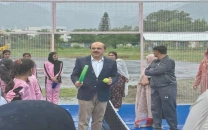US Congress passes Malala Yousafzai Scholarship Act for Pakistani women
The bill expands number of scholarships to women in Pakistan under a merit and needs-based programme

The US Congress has passed a bill named after Nobel laureate Malala Yousafzai that expands the number of scholarships to women in Pakistan under a merit and needs-based programme, according to the information posted on the congressional website.
The ‘Malala Yousafzai Scholarship Act’ was passed by the House of Representatives in March 2020, and the US Senate adopted it by a voice vote on January 1, 2021.
It has now been sent to the White House for US President Donald Trump to sign it into law.
The bill requires the US Agency for International Development (USAID) to award at least 50 per cent of scholarships under a Pakistan-based higher education scholarship programme to Pakistani women, from 2020 to 2022, across a range of academic disciplines and in accordance with existing eligibility criteria.
The USAID is also required to consult with and leverage investments by the Pakistani private sector and Pakistani diaspora in the United States to improve and expand access to education programmes in Pakistan as per the norms of the bill.
The agency has to brief the Congress annually on the number of scholarships awarded under the programme, including breakdowns by gender, discipline, and degree type.
The percentage of recipients who were involuntarily pushed out of the programme for failure to meet programme requirements; and the percentage of recipients who dropped out of school, including due to retaliation for seeking education will also be calculated.
Since 2010, the USAID has awarded more than 6,000 scholarships for young women to receive higher education in Pakistan. The bill expands this programme.



















COMMENTS
Comments are moderated and generally will be posted if they are on-topic and not abusive.
For more information, please see our Comments FAQ